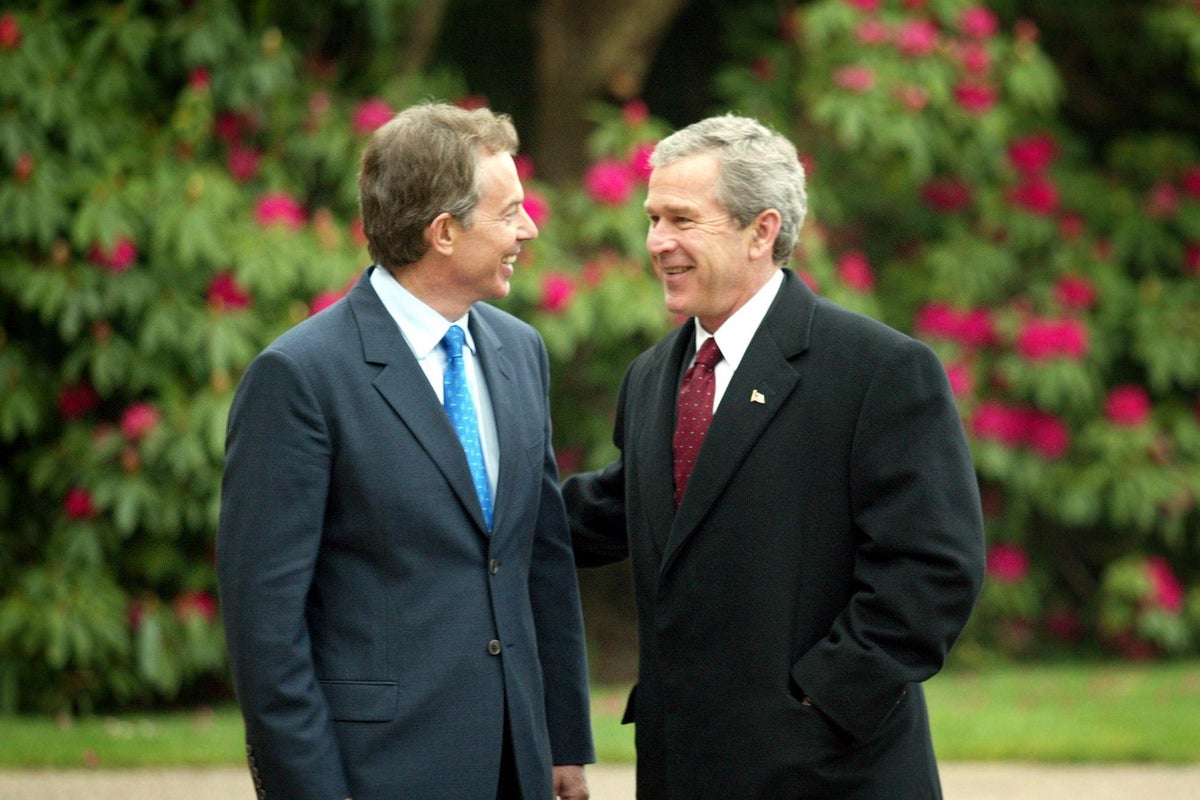
Tony Blair was desperate to establish good relations with US president George Bush, according to newly released official documents.
The former prime minister was famously close to Mr Bush’s predecessor, Bill Clinton, and there was concern in Number 10 that would not go down well with the new Republican “neo-con” administration in Washington.
Files released to the National Archives in Kew, west London, show Mr Blair was the first foreign leader to call to congratulate the president-elect when his victory was finally confirmed by the Supreme Court in December 2000 following a prolonged dispute over the count in Florida.
Michael Tatham in the No 10 private office noted that the eight-minute conversation had established “as good a rapport as one could hope for” from such a short call.
It will not be as cosy as with the Clinton administration. Unlike Clinton they will not do political favours for us— Jonathan Powell, Blair's chief of staff
“The prime minister asked early on if he could call the president-elect by his first name: Bush warmly assented (but stuck to addressing the prime minister as ‘sir’),” he wrote.
Mr Bush had defeated Mr Clinton’s former vice-president Al Gore, although Britain’s ambassador Sir Christopher Meyer wryly noted the outcome could have been different “had Clinton averted his gaze from Lewinsky’s thong” – a reference to his affair with White House intern Monica Lewinsky.
Mr Blair, meanwhile, was impatient to build on the promising opening and establish links with the incoming administration as soon as possible.
When it emerged that Donald Rumsfeld was to be the new US defence secretary, Mr Blair dashed off a handwritten note saying: “We must get alongside at a ministerial level quickly.”
In the run-up to Mr Bush’s inauguration on January 20 2001, the prime minister dispatched his chief of staff Jonathan Powell and foreign policy adviser John Sawers – a future MI6 chief – to Washington to meet with senior figures.
They returned from two days of talks broadly encouraged by what they heard – although cautioning that it would not be the same as the Clinton days.
“All of these circles are anglophile and your message about working closely with the new administration was well-received,” Mr Powell wrote.
“They all said they wanted to keep the relationship special. It will not however be as cosy as with the Clinton administration. Unlike Clinton they will not do political favours for us.”
Mr Sawers added: “Bush’s team are building him up as the new president. They extol his qualities (clear-headed, good decision taker, puts a premium on loyalty and team work, strong at sizing people up quickly and well) and they all refer to him deferentially. Woe betide anyone who belittles him.
“They are especially strong on defence ((Dick) Cheney, Rumsfeld, (Colin) Powell) and unequivocally warm towards Britain. But they have an uncertain touch on Europe. There may be one too many Big Beasts: we can expect some jostling.”
The following month, Mr Blair made his first visit to meet Mr Bush at his presidential retreat at Camp David – an encounter that went better than anyone in No 10 had dared hope.
The new president delighted the Downing Street team by reaffirming his commitment to the “special relationship”, describing the UK as “our strongest friend and closest ally” and calling Mr Blair “a pretty charming guy”.
In a handwritten note to Mr Bush and his wife Laura, Mr Powell gushed: “It was a thrill to me to be able to tell my children that I had stayed at the presidential retreat.
“And I felt the British and American teams hit it off well; a strong beginning to what will, I am sure, become a strong working relationship.”
There were, however, still sensitivities. When it emerged that Mr Blair was planning to meet Mr Clinton in London, Mr Powell said he should warn the White House.
“My own view is that seeing Clinton on June 9/10 would give out the wrong message. Much better to put him off to the autumn,” he wrote.
Mr Blair also found that Mr Bush was not always an easy partner.
“The real anxiety is that the harder edge to the Bush foreign policy passes into arrogance, in outside perception, and from there swiftly to hostility,” he wrote in one handwritten aside. “It is reminiscent, a little of the Eurosceptic/Thatcherite line here.”
He later added: “The real danger is not that he has a worked out desire to alienate everyone; but that he takes individual decisions without recognising their cumulative effect.”







